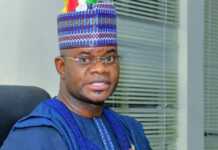 The Kaduna State Governor , Nasir El-Rufai has said that the 2018 budget of the state will focus on the social sector aimed at addressing people related issues.
The Kaduna State Governor , Nasir El-Rufai has said that the 2018 budget of the state will focus on the social sector aimed at addressing people related issues.
To this end, he said, N51.5 billion out of the total budget of N216.55 billion will be spent on Education, Health and Social Development.
Mr. El-Rufai, who spoke Tuesday at the budget signing ceremony inside the council chamber of the governor’s office, said the allocation to the three sector is the “largest chunk of the budget”, adding that the emphasis placed “should not surprise anyone.”
The governor said the Restoration Programme, the document on which he campaigned, is premised on expanding the people’s access to education and health, and improving outcomes for them.
“‘These are the primary sectors for building human capital. And we have no doubt that this is what responsible leadership commands.
“In fact, it is the substantive essence of democracy to practice public policy in a way that empowers the people, including the poor, by providing a sustainable ladder for social mobility,” he said.
He also said social sector spending reflects his commitment to equality of opportunity, a determination to give the poor and their children a realistic chance to improve their life chances.
“In devoting more than N33 billion to Education, we are signalling that we will not be deterred from our quest to provide decent education, within safe and standard school environments using qualified teachers.
“This commitment to equality of opportunity is also driving investments in the health sector. We shall continue to equip our health facilities, improve the availability of medicines and prioritise routine immunisation.
“All these will be supported by spending on infrastructure. The Ministry of Works, Housing and Transport has a capital budget of N28.3 billion, while the Ministry of Water Resources has N11 billion,” he said.
The Kaduna governor said by the allocations, his government has “prioritised the interest of the many over those of the few.”
The state government is currently in the process of recruiting nearly 20,000 qualified primary school teachers to replace those who failed primary four tests administered to them recently.
He said the radical actions in the education sector was taken in consideration of the future of two million primary school pupils as being above whatever sentiments 22,000 unqualified teachers may mobilise.
“Our public service reform programme similarly recognises that effective service delivery needs a dynamic, highly-skilled, IT-savvy, and youthful public service.
“As important as the public service is, all those who work for it represent less than 1 per cent of the population of the state. We must take good care of the public service, but we cannot do this by neglecting the other 99 per cent of the state that does not work for government.
“In a democracy, government cannot exist to serve only those who lead and work for it. Government must shed weight so that public resources can be more fully devoted to providing public goods, benefitting the generality of the populace,” he said.
He said the government understands the mandate it has been given as a solemn duty to do what is necessary, significant and consequential.
“Populism is the easy way in a universe of sentiment, where everybody desires the good but few are willing to accept the sacrifices that will entail.
“We will not refuse to take difficult decisions so that we can win temporary applause. We will do what is required to solve difficult problems. We will not succumb to those who have a sense of entitlement, but we will do what we must to promote equality of opportunity. And we trust that deep down, our people know that these tough choices are in their best interests,” he said.
Mr. El Rufai said his government will continue to stand with the ordinary man and woman “so that they can send their children to proper public schools, access affordable healthcare, travel on safe roads and maintain high sanitation standards through reliable water supply”.
Source: ( Premium Times )



